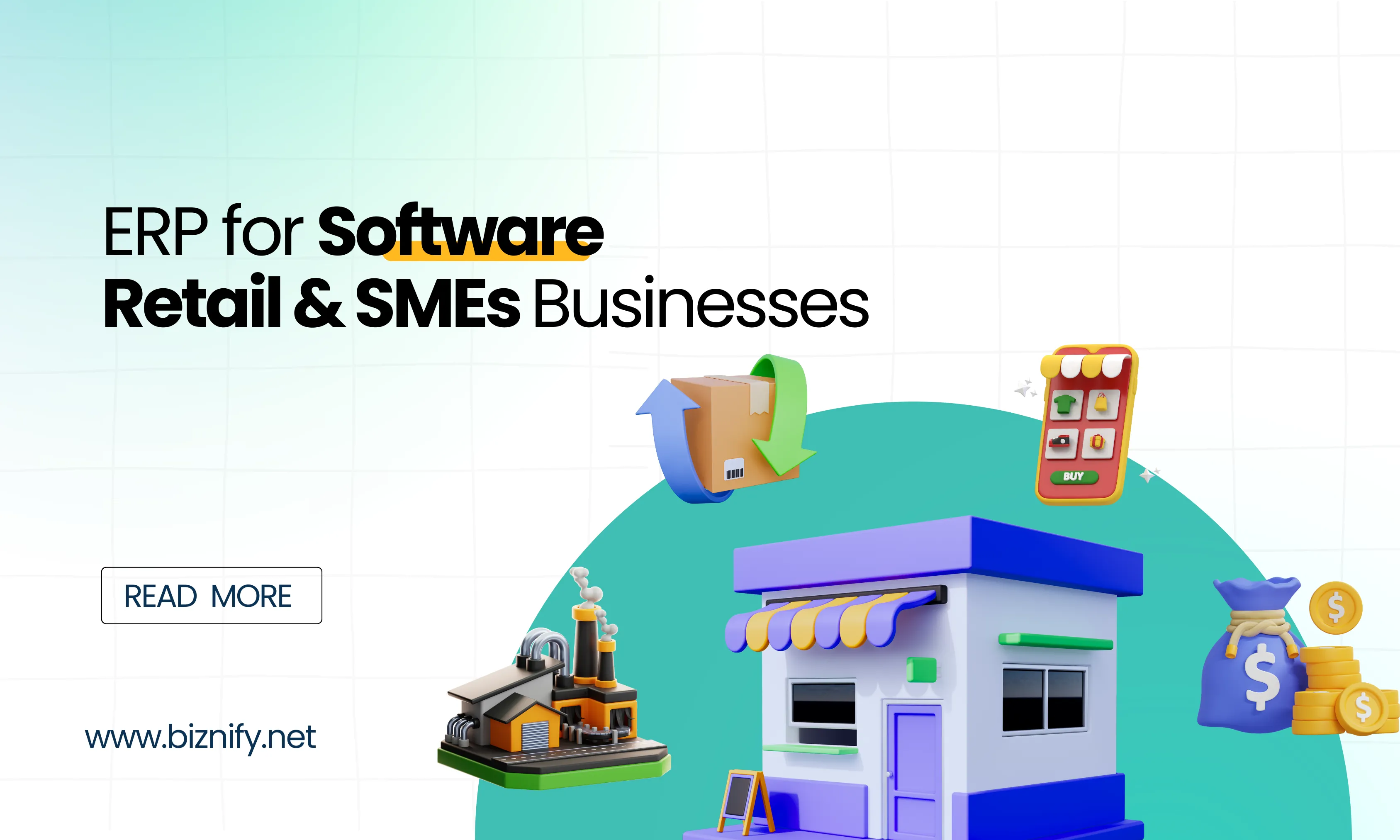
In today's competitive retail landscape, small and medium enterprises (SMEs) in Bangladesh face the constant challenge of staying efficient and responsive to market demands through effective inventory management, financial reporting, customer relationship management, and scalability. ERP systems offer a comprehensive solution to address these challenges.
Enter ERP (Enterprise Resource Planning) systems—an all-in-one solution designed to streamline operations, optimize resources, and drive business growth. As ERP adoption among small businesses continues to rise, more retail SMEs in Bangladesh are recognizing the immense value these systems bring.
In this article, we’ll dive into the critical role ERP systems play for retail SMEs in Bangladesh, explore the benefits they offer, and uncover why more businesses are making the shift to ERP.
In Bangladesh’s retail scene, small and medium-sized enterprises (SMEs) are the lifeblood of the economy. But let's be real—these businesses face some tough challenges that can slow down their growth. Whether it’s keeping track of inventory, managing customer relationships, or staying on top of financial records, retail SMEs have their hands full every day.
This is where ERP systems step in. They’re not just another software—they’re a practical solution to some of the most common headaches that retail SMEs deal with.
Better Inventory Management:
Automate your inventory, so you’ve always got the right products in stock.
No more worries about having too much or too little on your shelves.
Save money and increase profits by keeping your inventory just right.
Improved Customer Relationships:
Keep track of what your customers like, so you can offer more personalized service.
Make sure your customers keep coming back by meeting their needs better.
Attract new customers with marketing that’s based on real insights.
Accurate Financial Reporting:
Let ERP handle your financials, giving you up-to-the-minute insights.
Make smart business decisions with reliable data at your fingertips.
Stay on top of your financial records, ensuring you’re always in compliance.
At the end of the day, ERP systems are more than just tools—they’re essential for retail SMEs in Bangladesh who want to stay ahead in a competitive market. By tackling key issues like inventory management, customer relationships, and financial reporting, ERP systems help businesses run more smoothly, cut costs, and grow.
As more SMEs in Bangladesh see the benefits, ERP adoption is only going to increase, making it a must-have for anyone serious about long-term success. Investing in an ERP system that’s built for small businesses in Bangladesh isn’t just about staying in the game—it’s about setting yourself up to win.
When it comes to retail SMEs in Bangladesh, choosing the right ERP system is crucial. The key features of ERP systems can make a significant difference in how efficiently your business operates and how well you serve your customers. Let’s dive into some of the most important features that are particularly beneficial for retail businesses.
One of the standout features of ERP systems is advanced inventory control. For retail SMEs, keeping track of stock levels is essential. With ERP, you can automate inventory management, ensuring you always know what’s in stock and what’s running low. This not only helps in avoiding overstocking or stockouts but also saves money and boosts customer satisfaction by ensuring popular items are always available.
Real-time data analytics is a key feature of ERP systems that empowers retailers to make data-driven decisions, optimize supply chain management, and enhance overall business automation. In the fast-paced retail world, having access to up-to-the-minute data is vital. ERP systems provide real-time insights into sales, inventory, customer behavior, and more.
This allows you to make informed decisions quickly, whether it’s adjusting your product offerings or refining your marketing strategies. With real-time analytics, you can stay ahead of trends and respond to market demands promptly.
Scalability is also a key feature that makes ERP systems indispensable for growing retail SMEs. As your business expands, your ERP system can easily scale to accommodate more products, customers, and even new locations. This flexibility means you won’t outgrow your ERP system, and it will continue to support your business as it evolves.
Scalability ensures that your business can handle increased demand without missing a beat, making it a smart investment for the future.
These features—inventory control, real-time data analytics, and scalability—are more than just technical tools. They’re essential components that can drive efficiency, improve customer satisfaction, and support the growth of retail SMEs in Bangladesh. By leveraging these features, retail businesses can streamline their operations, make smarter decisions, and stay competitive in an ever-changing market.
Choosing the right ERP system for your retail SME is a crucial decision that can greatly impact your business’s efficiency and growth. Here’s a step-by-step guide to help you make the best choice:
Start by identifying what your retail SME truly needs from an ERP system. Do you need better inventory management, more streamlined financial reporting, or enhanced customer relationship management? Understanding your specific requirements will help you narrow down the options to systems that offer the best ERP features for retail businesses.
Budget is a significant factor when selecting an ERP system. It’s essential to find a solution that fits within your financial constraints without compromising on essential features. Look for ERP systems that offer scalable pricing models, so you can start small and expand as your business grows. Remember, investing in the right ERP can save you money in the long run by automating processes and reducing errors—key aspects of retail business automation in Bangladesh.
The best ERP system is one that your team can easily adopt and use daily. Look for an ERP system that offers a user-friendly interface, minimal training requirements, and seamless integration with your existing business automation and supply chain management processes. The easier it is to use, the quicker your team can get up to speed, and the more value you’ll get from your investment.
Look for systems with intuitive dashboards and clear navigation to ensure a smooth transition for your staff.
Strong vendor support is crucial, especially for small businesses in Bangladesh. Choose an ERP provider that offers comprehensive support, including training, troubleshooting, and regular updates. A reliable vendor will be there to help you address any issues that arise, ensuring that your ERP system continues to run smoothly and efficiently.
Before making a final decision, request demos or trials from your shortlisted ERP providers. This hands-on experience will give you a better understanding of how the system works and whether it meets your business needs. Pay attention to how well the system integrates with your existing processes and how it can be customized to suit your specific requirements.
Finally, think about your business’s future growth when choosing an ERP system. You need a solution that can scale with your business, adding more functionality and capacity as your retail SME expands. Scalability is a critical factor in ensuring that your ERP system remains a valuable asset as your business evolves.
By following these steps, you’ll be well on your way to selecting the best ERP system for your retail SME. This decision will not only streamline your operations but also position your business for long-term success in the competitive retail market in Bangladesh. Remember, the right ERP system is an investment in your business’s future, helping you automate processes, improve efficiency, and support growth.
Implementing an ERP system can be a game-changer for retail SMEs, but it's not without its challenges. Understanding these common hurdles and knowing how to address them can significantly enhance your ERP adoption journey.
One of the most significant challenges of ERP adoption in retail is the initial cost. ERP systems can be pricey, which might be daunting for small businesses with tight budgets. To overcome this, consider choosing a scalable ERP solution that fits your budget and grows with your business. Look for options with flexible pricing plans or cloud-based solutions that reduce upfront costs.
Another major hurdle is training staff to use the new ERP system effectively. Without proper training, your team might struggle with the new software, leading to inefficiencies. To address this, invest in comprehensive training programs and provide ongoing support. Many ERP vendors offer training resources, workshops, and customer support to help smooth the transition.
Resistance to change is a common issue when implementing new technologies. Employees may be accustomed to existing processes and hesitant to adapt to a new system. To tackle this, involve your team early in the implementation process. Communicate the benefits of ERP clearly and demonstrate how it will make their jobs easier. Engaging employees and addressing their concerns can help ease the transition.
Migrating data from old systems to the new ERP can be tricky and prone to errors. To mitigate data migration challenges, plan carefully and consider leveraging data analytics tools to ensure a smooth transition and optimize your business automation processes. Conduct thorough data cleaning and validation before migration to ensure accuracy. Working with an experienced ERP consultant can also help ensure a smooth data transfer process.
Integrating ERP with your existing systems can pose technical challenges. Choose an ERP solution that offers seamless integration capabilities. Collaborate with your IT team or a consultant to ensure that the new system integrates smoothly with your current software and processes.
By addressing these challenges head-on, you can ensure a smoother ERP implementation process for your retail SME. Implementing the right ERP solution, with its best features for retail businesses can significantly boost your efficiency, streamline operations, and drive growth.
Answer: Implementing an ERP system for a retail SME in Bangladesh can offer numerous benefits, including:
Improved inventory management: Enhanced visibility into stock levels, reduced stockouts, and optimized inventory costs.
Organized financial operations: Automated accounting processes, accurate financial reporting, and improved cash flow management.
Enhanced customer relationship management (CRM): Better customer data management, personalized marketing campaigns, and improved customer satisfaction.
Increased operational efficiency: Manage proper workflows, reduced manual tasks, and improved decision-making.
Scalability: Ability to accommodate business growth and expansion.
Answer: Some common challenges faced by retail SMEs in Bangladesh when implementing an ERP system include:
High initial costs: The upfront investment can be significant for smaller businesses.
Resistance to change: Employees may resist adopting new technology and processes.
Data migration issues: Transferring data from existing systems can be complex and time-consuming.
Training and skill gaps: Employees may need training to effectively use the ERP system.
Integration with existing systems: Integrating the ERP system with other business software can be challenging.
Answer: When selecting an ERP system, retail SMEs in Bangladesh should consider the following factors:
Business needs: Identify the specific functionalities and features required to support business operations.
Budget: Determine the budget allocated for the ERP system and associated costs.
Scalability: Choose a system that can accommodate future growth and expansion.
Vendor reputation: Research the vendor's experience, reputation, and support services.
Implementation timeline: Consider the expected implementation timeline and potential disruptions.
Answer: A successful ERP implementation requires careful planning and execution. Key considerations include:
Project management: Establish a clear project plan with defined roles, responsibilities, and timelines.
Data migration: Ensure accurate and efficient data transfer from existing systems.
Training and user adoption: Provide comprehensive training to employees and address any resistance to change.
Integration with existing systems: Plan for seamless integration with other business software.
Ongoing support and maintenance: Establish a support plan to address issues and ensure the ERP system remains up-to-date.
Answer: An ERP system can enhance customer service in several ways:
Centralized customer data: Provides a comprehensive view of customer information, preferences, and purchase history.
Personalized marketing: Enables targeted marketing campaigns based on customer preferences and behavior.
Improved order fulfillment: Manage order processing and delivery, reducing customer wait times.
Enhanced customer support: Provides tools for efficient customer support, such as ticketing systems and knowledge bases.
Customer feedback management: Collects and analyzes customer feedback to identify areas for improvement.
Adopting an ERP system for retail SMEs in Bangladesh can revolutionize your business operations. We’ve explored how ERP enhances efficiency, reduces costs, and supports scalable growth.
Key benefits include organized inventory management, improved financial oversight, and better customer relationship management. Despite challenges like initial costs, training needs, and resistance to change, these hurdles can be effectively managed with careful planning and the right support.
Don't let these challenges hold you back. Embrace the benefits of ERP and drive your growth. Ready to transform your retail business? Request a free consultation today to see how ERP can specifically benefit your business and take the first step towards optimized operations and increased profitability.
Get a guided product demo tailored to your business needs. No assumptions. No generic walkthroughs. Just real use cases.
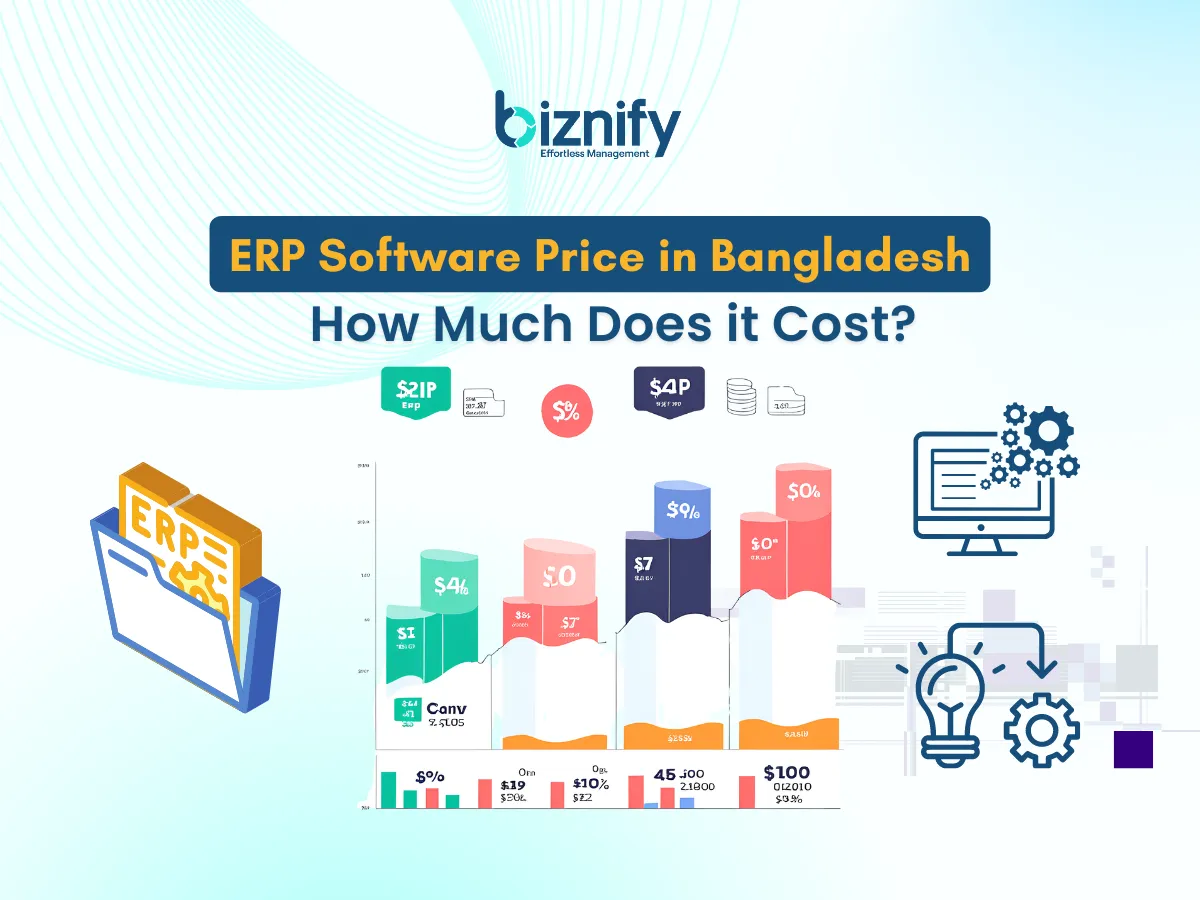
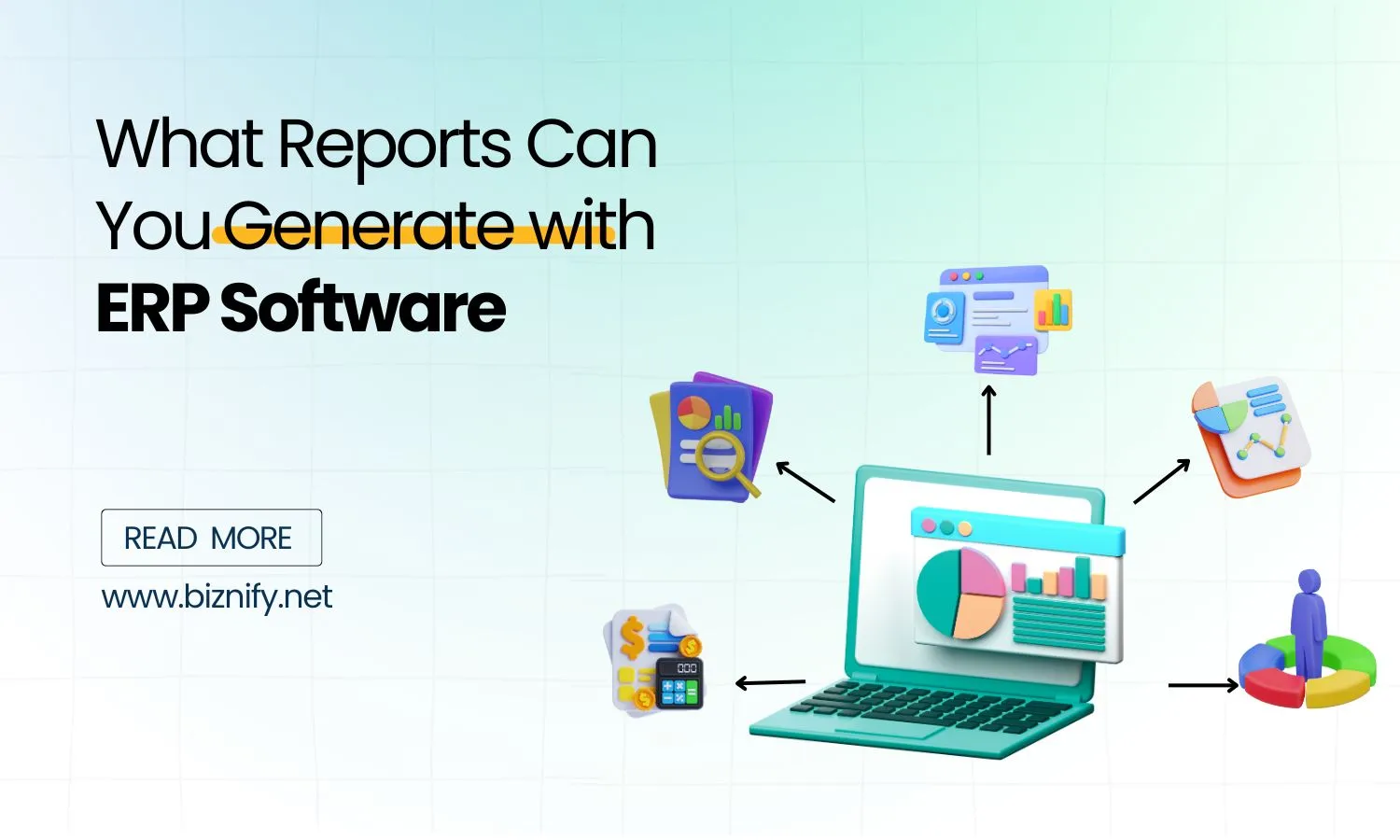
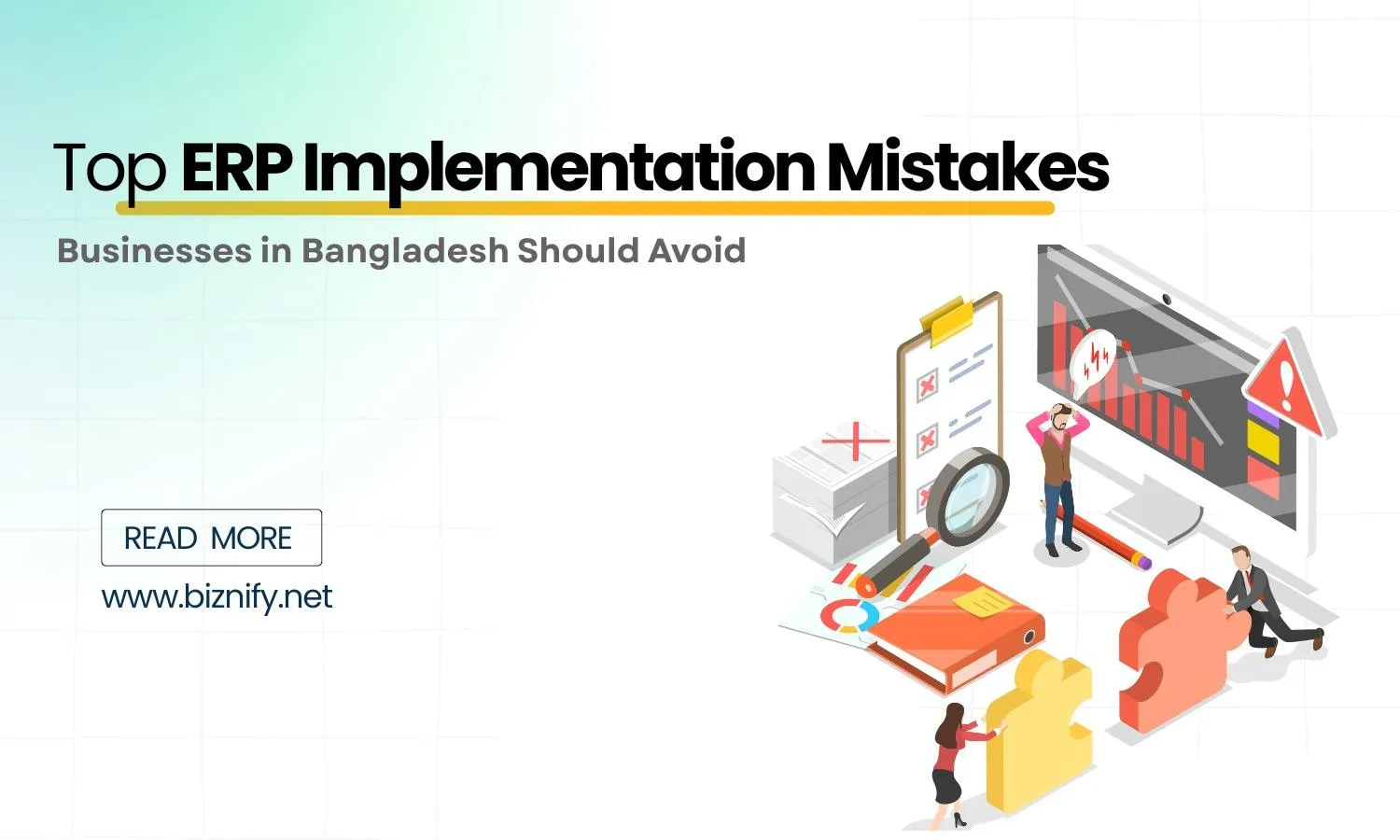
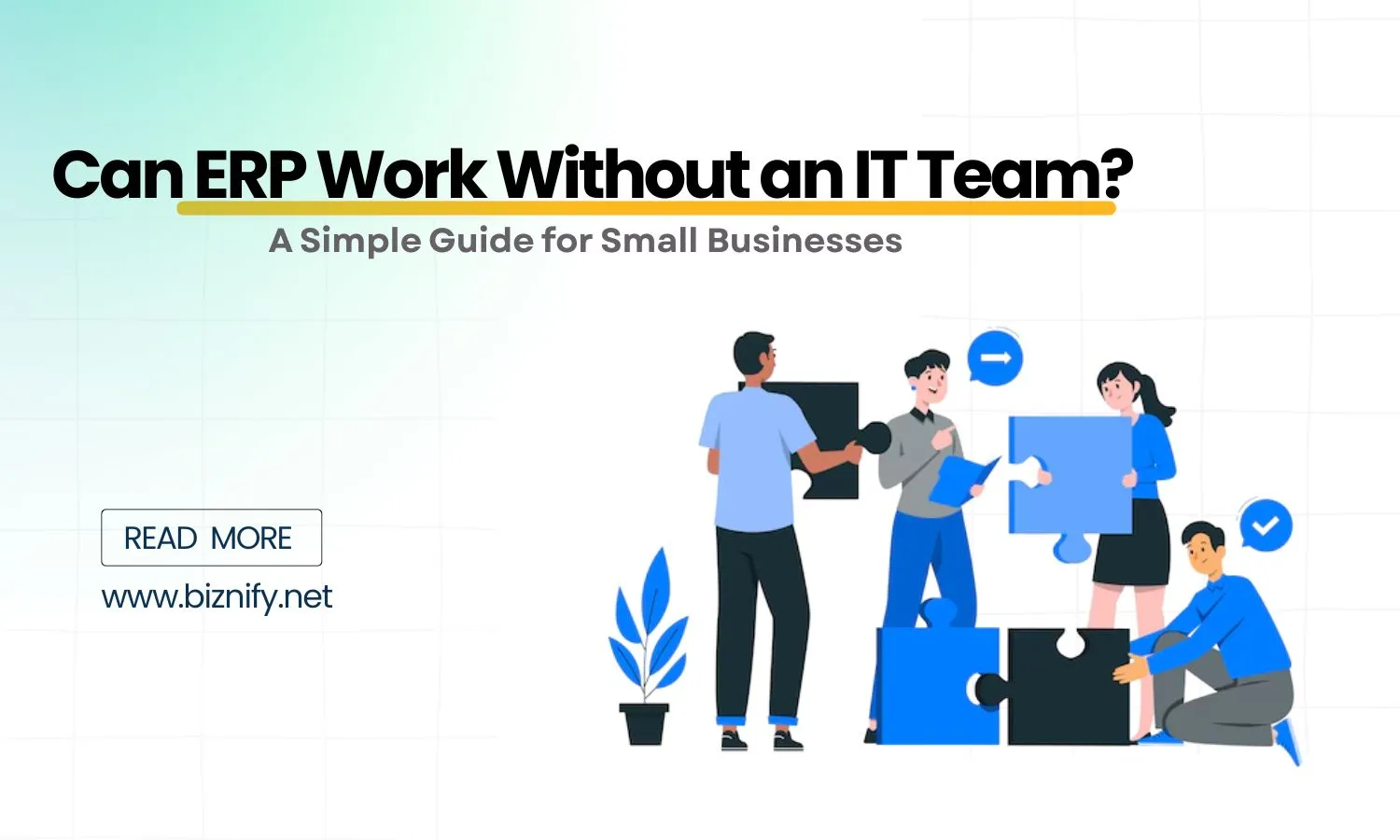
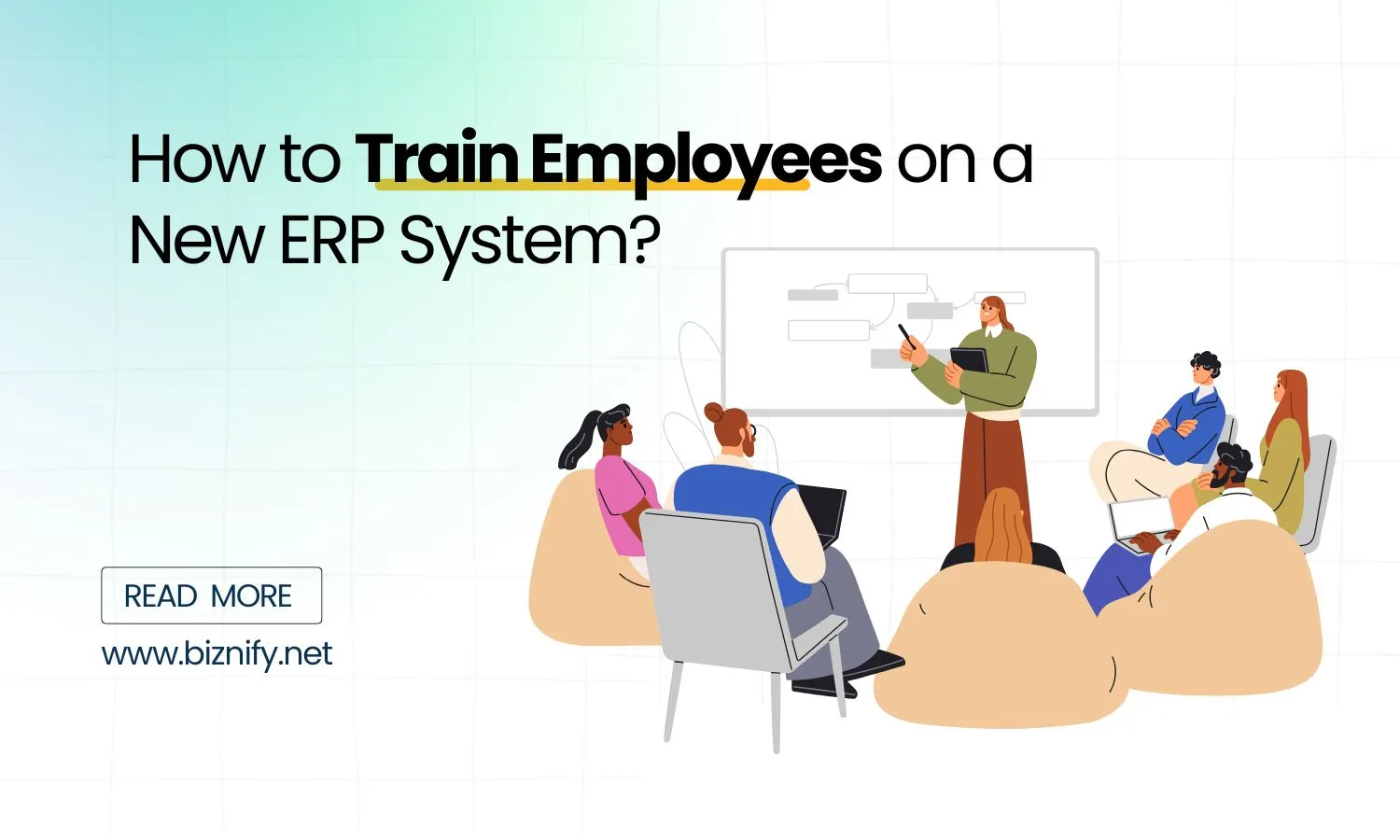
Just exploring ERP or unsure which modules you need? The Biznify team’s here with straight answers.